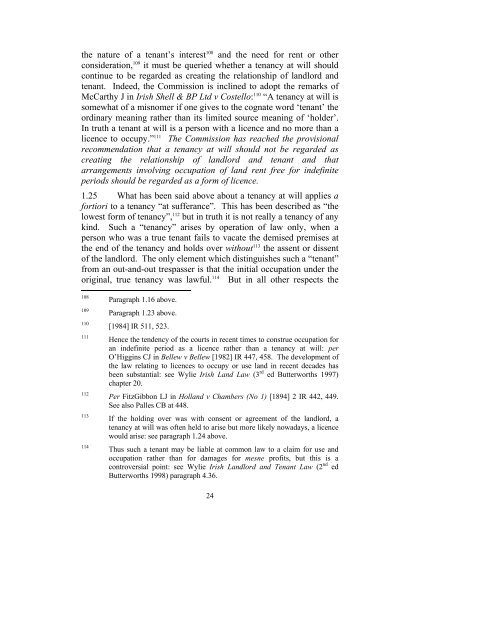Consultation Paper on the General Law of the Landlord and Tenant
Consultation Paper on the General Law of the Landlord and Tenant
Consultation Paper on the General Law of the Landlord and Tenant
Create successful ePaper yourself
Turn your PDF publications into a flip-book with our unique Google optimized e-Paper software.
<strong>the</strong> nature <strong>of</strong> a tenant’s interest 108 <strong>and</strong> <strong>the</strong> need for rent or o<strong>the</strong>rc<strong>on</strong>siderati<strong>on</strong>, 109 it must be queried whe<strong>the</strong>r a tenancy at will shouldc<strong>on</strong>tinue to be regarded as creating <strong>the</strong> relati<strong>on</strong>ship <strong>of</strong> l<strong>and</strong>lord <strong>and</strong>tenant. Indeed, <strong>the</strong> Commissi<strong>on</strong> is inclined to adopt <strong>the</strong> remarks <strong>of</strong>McCarthy J in Irish Shell & BP Ltd v Costello: 110 “A tenancy at will issomewhat <strong>of</strong> a misnomer if <strong>on</strong>e gives to <strong>the</strong> cognate word ‘tenant’ <strong>the</strong>ordinary meaning ra<strong>the</strong>r than its limited source meaning <strong>of</strong> ‘holder’.In truth a tenant at will is a pers<strong>on</strong> with a licence <strong>and</strong> no more than alicence to occupy.” 111 The Commissi<strong>on</strong> has reached <strong>the</strong> provisi<strong>on</strong>alrecommendati<strong>on</strong> that a tenancy at will should not be regarded ascreating <strong>the</strong> relati<strong>on</strong>ship <strong>of</strong> l<strong>and</strong>lord <strong>and</strong> tenant <strong>and</strong> thatarrangements involving occupati<strong>on</strong> <strong>of</strong> l<strong>and</strong> rent free for indefiniteperiods should be regarded as a form <strong>of</strong> licence.1.25 What has been said above about a tenancy at will applies afortiori to a tenancy “at sufferance”. This has been described as “<strong>the</strong>lowest form <strong>of</strong> tenancy”, 112 but in truth it is not really a tenancy <strong>of</strong> anykind. Such a “tenancy” arises by operati<strong>on</strong> <strong>of</strong> law <strong>on</strong>ly, when apers<strong>on</strong> who was a true tenant fails to vacate <strong>the</strong> demised premises at<strong>the</strong> end <strong>of</strong> <strong>the</strong> tenancy <strong>and</strong> holds over without 113 <strong>the</strong> assent or dissent<strong>of</strong> <strong>the</strong> l<strong>and</strong>lord. The <strong>on</strong>ly element which distinguishes such a “tenant”from an out-<strong>and</strong>-out trespasser is that <strong>the</strong> initial occupati<strong>on</strong> under <strong>the</strong>original, true tenancy was lawful. 114 But in all o<strong>the</strong>r respects <strong>the</strong>108109110111112113114Paragraph 1.16 above.Paragraph 1.23 above.[1984] IR 511, 523.Hence <strong>the</strong> tendency <strong>of</strong> <strong>the</strong> courts in recent times to c<strong>on</strong>strue occupati<strong>on</strong> foran indefinite period as a licence ra<strong>the</strong>r than a tenancy at will: perO’Higgins CJ in Bellew v Bellew [1982] IR 447, 458. The development <strong>of</strong><strong>the</strong> law relating to licences to occupy or use l<strong>and</strong> in recent decades hasbeen substantial: see Wylie Irish L<strong>and</strong> <strong>Law</strong> (3 rd ed Butterworths 1997)chapter 20.Per FitzGibb<strong>on</strong> LJ in Holl<strong>and</strong> v Chambers (No 1) [1894] 2 IR 442, 449.See also Palles CB at 448.If <strong>the</strong> holding over was with c<strong>on</strong>sent or agreement <strong>of</strong> <strong>the</strong> l<strong>and</strong>lord, atenancy at will was <strong>of</strong>ten held to arise but more likely nowadays, a licencewould arise: see paragraph 1.24 above.Thus such a tenant may be liable at comm<strong>on</strong> law to a claim for use <strong>and</strong>occupati<strong>on</strong> ra<strong>the</strong>r than for damages for mesne pr<strong>of</strong>its, but this is ac<strong>on</strong>troversial point: see Wylie Irish <strong>L<strong>and</strong>lord</strong> <strong>and</strong> <strong>Tenant</strong> <strong>Law</strong> (2 nd edButterworths 1998) paragraph 4.36.24
















